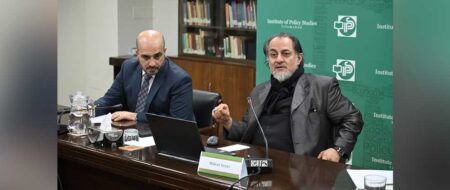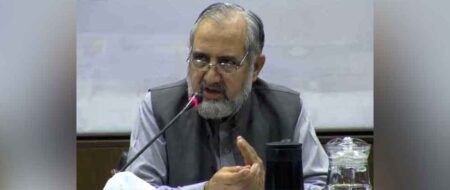FATA: Beyond Military Operation
Seminar calls for mainstreaming FATA and empowering its people
Experts at a seminar at Institute of Policy Studies, Islamabad termed mainstreaming of FATA and giving its inhabitants stake in their governance as the only rational way forward, post military operations.
The seminar, ‘FATA: Beyond Military Operation’, was addressed by Ambassador (retd) Ayaz Wazir, Saleem Safi, analyst, Nasir Dawar, FATA journalist, and moderated by Brigadier (retd) Said Nazir, senior IPS associate.
The experts discussed the issue at length, lamenting that there was no representation of people of FATA in decision making about their region and themselves; their parliamentarians can participate in legislations about issues related to the whole country except their own.
Ayaz Wazir stressed that as per the constitution of Pakistan, people of FATA should be allowed to decide for themselves how would they like to be governed. The region, according to him, could be included in the province of Khyber Pakhtunkhwa or given a separate constitutional status like that of Gilgit-Baltistan under the federation so that they could have a dedicated governor who could govern the region through a specially constituted ‘FATA Council’ having elected representations from each tribal agency.
He said that unlike Pakistan, the Wazirs, Mehsuds, Mohmands and other tribal people on the other side of the Pak-Afghan border enjoy same constitutional and legal rights as that of the people in Kabul, Mazar Sharif and the rest of Afghanistan.
The former ambassador also regretted the fact that even in the team appointed by the government for the peace dialogues with TTP earlier this year there was no representation from the tribal areas despite of them being the primary stakeholders.
The claim was confirmed by Saleem Safi, who added that the peace talks were wrongly timed and ill-planned. The militants, he said, had already left the target areas well before the operation and it was the common men of FATA who were suffering in the end. He further added that the inhabitants of North Waziristan were given very little time to leave the area and even their transportation was not aided by the government despite of claims.
Safi pointed that the ideological and strategic aspects influencing FATA’s situation were more important than the economic, political and social ones. He emphasized that the country’s diplomatic front needs to be energized to check the international conspiracies and various proxy wars being fought in the region.
Nasir Dawar gave an insight to the area’s ground situation before and after the military operation. He deplored that the opportunity to exploit the infighting between the militant groups in FATA was lost due to the operation.
Speaking of the IDP camps, the correspondent said that the displaced people of North Waziristan were in a very bad state and their life in camps was full of sufferings. Their future, according to him, didn’t look very good as well if the present situation of South Waziristan’s people, who were displaced in 2009, is taken for the reference.
Brig (retd) Said Nazir stated that there was a total disconnect in the political dispensation and the military operations. The civil administration was yet to retake the control in even South Waziristan and Swat despite passing of many years after the areas have been cleared through military operations.
He however maintained that the situation was still manageable but it only required political will. The challenge, he said, could be accomplished by winning the hearts and minds of the people of FATA.












